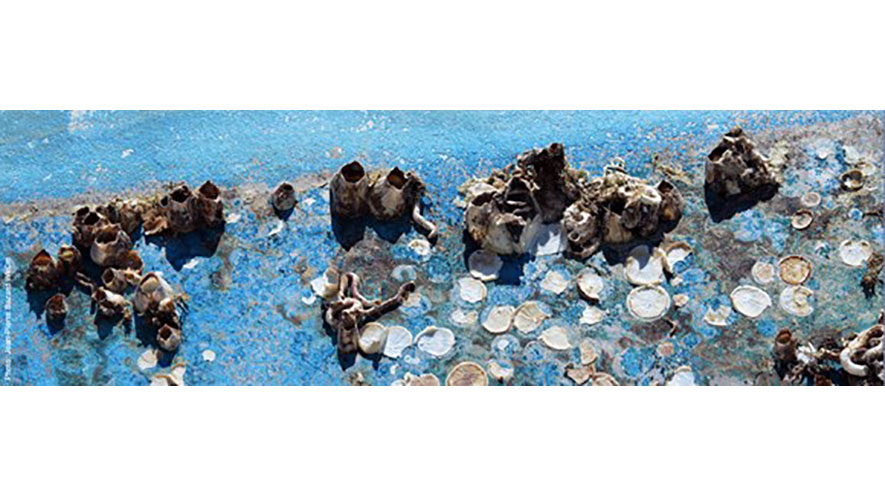A new international effort to combat the negative environmental impacts of the transfer of aquatic species through ships has been launched this week.
The GloFouling Partnerships project - a collaboration between the Global Environment Facility (GEF), the United Nations Development Programme (UNDP) and the International Maritime Organization (IMO) - will address the build-up of aquatic organisms on a ship’s underwater hull and on other marine mobile infrastructure.
The introduction of invasive aquatic organisms into new marine environments not only affects biodiversity and ecosystem health, but also has measurable impacts on a number of economic sectors such as fisheries, aquaculture and ocean energy. Therefore, addressing invasive aquatic species is not only a matter of ensuring the health and integrity of marine ecosystems, but ultimately about safeguarding ecosystem services that sustain the livelihoods of coastal communities across the globe.
The GloFouling project will drive actions to implement the IMO Guidelines for the control and management of ships’ biofouling, which provide a globally-consistent approach on how biofouling should be controlled and managed to minimize the transfer of invasive aquatic species through ships’ hulls. The project will also spur the development of best practices and standards for improved biofouling management in other ocean industries.
Twelve countries, representing a mix of developing nations and Small Island Developing States, have been selected to spearhead the work of the GloFouling project: Brazil, Ecuador, Fiji, Indonesia, Jordan, Madagascar, Mauritius, Mexico, Peru, the Philippines, Sri Lanka and Tonga.
The GEF is providing a US$6.9 million grant to deliver a range of governance reforms at the national level, through numerous capacity-building activities, training workshops and opportunities for technology adoption to help address the issue of invasive species. Strong participation from private sector stakeholders is also expected, replicating the successful public-private sector partnership model used by IMO in previous projects.
While IMO will focus on shipping, the Intergovernmental Oceanographic Commission of UNESCO (IOC) will join the three main partners (GEF, UNDP, IMO) to lead the approach to other marine sectors with a view to developing best practices that may address the transfer of invasive aquatic species through improved biofouling management. IOC-UNESCO will work hand in hand with the GloFouling project to increase awareness of this environmental challenge among key stakeholders.
Contributing to the efforts of IOC-UNESCO, the World Ocean Council (WOC) has been selected to engage and channel the participation of private sector companies for the development of best industry practices in non-shipping sectors such as aquaculture and oil and gas extraction. WOC will be working with the private sector to spur business action and encourage investment in biofouling solutions through dedicated sessions of the WOC Ocean Investment Platform.
Hiroyuki Yamada, Director of the Marine Environment Division, IMO, praised the commitment of the twelve developing countries that have taken the global lead towards the achievement of the project objectives. He stated, “This joint effort to implement the IMO Biofouling Guidelines and best practices for other marine industries will help nations to deliver essential contributions to the 2030 Agenda for Sustainable Development Goals.”
He further highlighted the additional contribution of biofouling management to the reduction of greenhouse gas emissions from shipping through energy-efficiency gains resulting from clean hulls.
The GloFouling Project has already received endorsement from over 40 major stakeholders, representing academia, industry associations, technology developers and private sector companies covering a broad spectrum of the blue economy.
Andrew Hudson, Head, UNDP Water & Ocean Governance Programme, said, “We know with high certainty that biofouling of ships and other mobile marine infrastructure is a serious environmental issue that can lead to the introduction of invasive species around the world. UNDP is very pleased to collaborate once more with the GEF and IMO to take steps to address this important issue through a project that brings numerous environmental benefits.”
Chris Severin, Senior Environmental Specialist from the GEF, said, “The implementation of the GloFouling Partnerships will be instrumental in battling aquatic invasive species, and will not only lead to healthier more robust marine ecosystems, but also offer an opportunity to unlock blue economy potentials through the stimulation of public-private sector investments.”
Source: IMO





